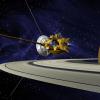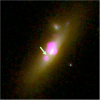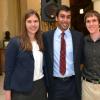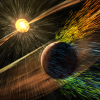Space
 A new study led by the European Space Agency and NASA involving the University of Colorado Boulder indicates NASA's Cassini spacecraft has detected the faint but distinct signature of dust coming from beyond our solar system.
A new study led by the European Space Agency and NASA involving the University of Colorado Boulder indicates NASA's Cassini spacecraft has detected the faint but distinct signature of dust coming from beyond our solar system. High-tech hardware designed and built at the University of Colorado Boulder will be launched to the International Space Station (ISS) aboard the commercial SpaceX Dragon capsule on Friday, April 8.
High-tech hardware designed and built at the University of Colorado Boulder will be launched to the International Space Station (ISS) aboard the commercial SpaceX Dragon capsule on Friday, April 8. Comets and asteroids as large as West Virginia smacking into Mars some 4 billion years ago could have created a haven for life there not so long after the birth of the solar system.
Comets and asteroids as large as West Virginia smacking into Mars some 4 billion years ago could have created a haven for life there not so long after the birth of the solar system. <p>A CU-Boulder student team is shooting for the moon and beyond with a tiny satellite under development that has just taken another step closer to launch. As one of the top five teams selected by NASA, the team of 10 graduate students will continue developing a small CubeSat satellite about the size of a shoebox called the CU Earth Escape Explorer (CU-E3) with a $30,000 award from NASA.</p>
<p>A CU-Boulder student team is shooting for the moon and beyond with a tiny satellite under development that has just taken another step closer to launch. As one of the top five teams selected by NASA, the team of 10 graduate students will continue developing a small CubeSat satellite about the size of a shoebox called the CU Earth Escape Explorer (CU-E3) with a $30,000 award from NASA.</p> <p>Students at CU-Boulder, who built a dust counter for the New Horizons mission to Pluto, have been eyeing the data for decade now. And the results are showing the solar system really is pretty barren if you put aside the planets, rings, moons, comets and asteroids.</p>
<p>Students at CU-Boulder, who built a dust counter for the New Horizons mission to Pluto, have been eyeing the data for decade now. And the results are showing the solar system really is pretty barren if you put aside the planets, rings, moons, comets and asteroids.</p> <p>NASA has selected CU-Boulder researcher Raina Gough to join the Mars Curiosity rover mission as a participating scientist; she hopes to expand the science team’s search for evidence of liquid water.</p>
<p>NASA has selected CU-Boulder researcher Raina Gough to join the Mars Curiosity rover mission as a participating scientist; she hopes to expand the science team’s search for evidence of liquid water.</p> <p>An unusually star-deprived black hole at the site of two merged galaxies could provide new insight into black hole evolution and behavior.</p>
<p>An unusually star-deprived black hole at the site of two merged galaxies could provide new insight into black hole evolution and behavior.</p> <p>A NASA-funded miniature satellite built by University of Colorado Boulder students will launch at 5:55 p.m. EST on Thursday from Cape Canaveral, Florida, the start of a six-month-long mission to study solar flares and the powerful X-rays emitted by the sun.</p>
<p>A NASA-funded miniature satellite built by University of Colorado Boulder students will launch at 5:55 p.m. EST on Thursday from Cape Canaveral, Florida, the start of a six-month-long mission to study solar flares and the powerful X-rays emitted by the sun.</p> <p>United Launch Alliance (ULA) announced Thursday it's taking CubeSat rideshares to the next level by launching a new, innovative program offering universities the chance to compete for free CubeSat rides starting in 2017. The first free CubeSat launch is going to CU-Boulder.</p>
<p>United Launch Alliance (ULA) announced Thursday it's taking CubeSat rideshares to the next level by launching a new, innovative program offering universities the chance to compete for free CubeSat rides starting in 2017. The first free CubeSat launch is going to CU-Boulder.</p> <p>Scientists involved in NASA’s Mars Atmosphere and Volatile Evolution (MAVEN) mission, which is being led by the University of Colorado Boulder, have identified the process that appears to have played a key role in the transition of the Martian climate from an early, warm and wet environment that might have supported surface life to the cold, arid planet Mars is today.</p>
<p>Scientists involved in NASA’s Mars Atmosphere and Volatile Evolution (MAVEN) mission, which is being led by the University of Colorado Boulder, have identified the process that appears to have played a key role in the transition of the Martian climate from an early, warm and wet environment that might have supported surface life to the cold, arid planet Mars is today.</p>


